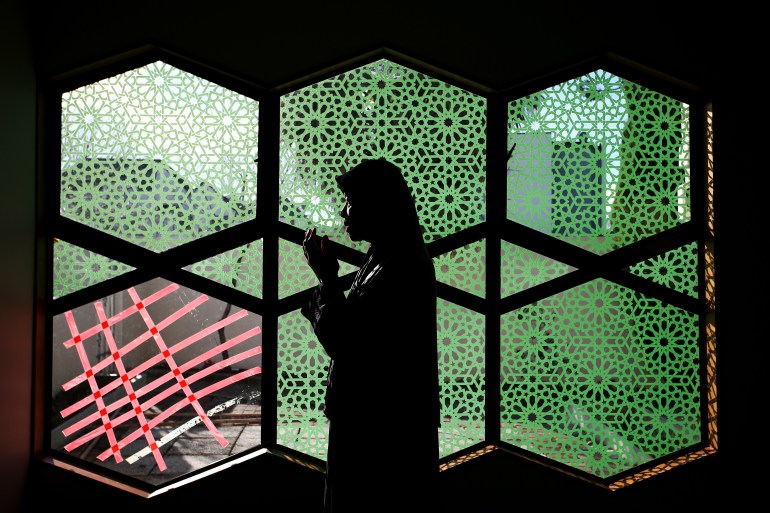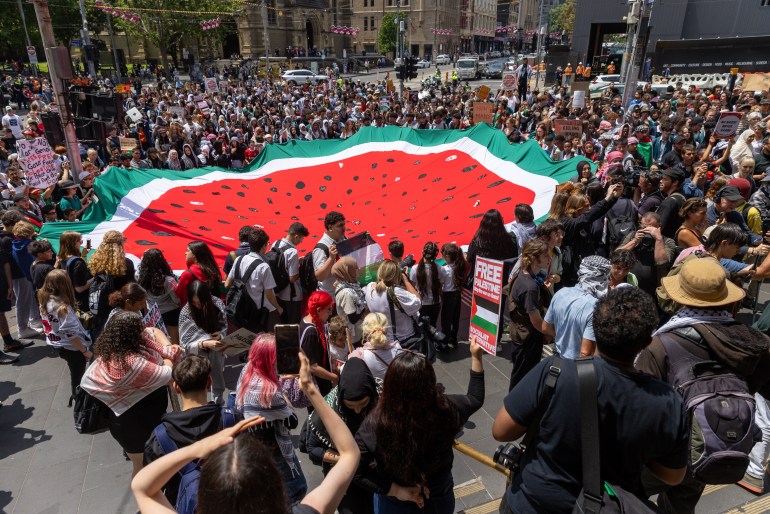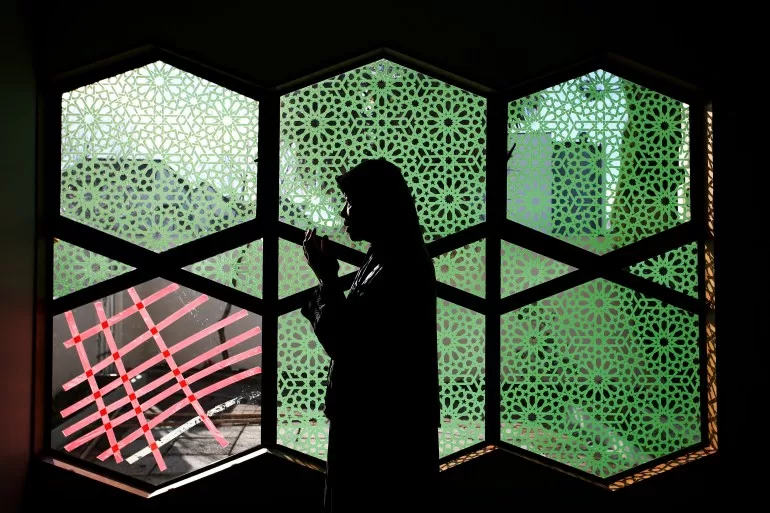Although the killer, who was jailed for life without parole, was born and radicalised in Australia, there has been little reflection on Islamophobia and racism in his country of origin.
“I think we’re looking for honesty and for reckoning. That honest reflection and accountability,” Rita Jabri Markwell, legal adviser to the Australian Muslim Advocacy Network (AMAN), told Al Jazeera.
“The Christchurch massacre didn’t happen because of just some crazed individual. It happened because of a culture that has been created in Australia for at least 20 years,” she added.
At first, Markwell’s advocacy on the Australian response to what happened in Christchurch focused on legal reforms to address the use of dehumanising language online.
But she soon realised she needed to expand her approach.
“I could see that we were dealing with this information machine which is far greater than just far-right groups,” she told Al Jazeera. “An information machine that’s actually much more mainstream.”
Through her role with AMAN, Markwell has worked on law reform in response to the Christchurch attacks both in Australia and internationally.

She has given evidence before the Australian parliament, to United Nations human rights experts and is currently awaiting the Queensland Human Rights Commission’s response to a complaint over the failure of social media platform X to remove hateful content.
“We just don’t remember this massacre that happened as an Australian thing,” Jordana Silverstein, a senior research fellow at the Melbourne Law School, told Al Jazeera.
“It’s just not being narrated as part of Australian history. And this is a real problem of Australia pretending that we’re not as racist as we are.”
An Australian story
Analysts say that heightened Islamophobia in Australia in the years leading up to the Christchurch attacks can be traced to the leadership of John Howard and the 2001 Tampa affair.
Howard, who was prime minister from 1996 until 2007, is also remembered in Australia for the gun buyback programme in the wake of the Port Arthur mass shooting, which left 35 people dead in April 1996.
But, Silverstein notes the story of Australia ending such attacks with strict gun laws has not been updated to include the Christchurch killings, or how Australia’s harsh response to refugees seeking asylum in boats influenced the nation’s psyche.
Nor has Australia reckoned with its long history of violence towards Aboriginal people, she adds.
“Australia remains a settler colony. And the colonisation, continued violence against Aboriginal people, is really central to how this country runs,” she said.
Jordan McSwiney, a postdoctoral fellow at the University of Canberra, agrees.
The Christchurch massacre “didn’t fall from the sky, nor is it necessarily this recent phenomenon,” he told Al Jazeera.
“White supremacy has a long and violent history. It’s one that we’re not really ready to grapple with.”
In New Zealand, an inquest into the mosque attacks is currently ongoing, and the implementation of recommendations from an earlier Royal Commission has been mixed.
Aliya Danzeisen, the national coordinator of the Islamic Women’s Council of New Zealand, has long worked long hours engaging with community groups and these ongoing government inquiries.
She says Muslim communities in New Zealand have found connection and inspiration through shared experiences with Muslim communities in Australia.
One area where Australian and New Zealand Muslims have worked together has been in pushing big tech companies to take responsibility for harmful speech on their platforms.
Researchers at the University of Auckland recently published more evidence that the Christchurch killer was posting violent messages online long before he carried out his attack and that neither the Australian nor New Zealand authorities acted on it.
While identifying the best ways to intervene in online hate speech is important, says Danzeisen, she also sees safety as something to be built through community connection.
“As individuals, we’ve got to build communities, real-life communities, and take time for ourselves in our communities offline,” she said.
“The way the online space is developed right now, it pushes you into forums with like-minded people. You don’t get to reflect on your own thoughts. You’re just regurgitating the same thing. We need to create environments that are more positive for reflective interactions.”
‘Glimmers of other possibilities’
Recent events in Australia suggest that five years after the Christchurch massacre, opportunities for community building are mixed.
Thousands of people have taken to the streets in weekly protests against Israel’s war on Gaza for more than five months.
As Silverstein notes, “the level of political action and solidarity across this country at the moment is really unprecedented.”
“So, I think there are glimmers of other possibilities.”

In contrast, the Australian government, and incumbent Labor party’s support for the war in Gaza has seen iftar dinners traditionally hosted by two Labor premiers during Ramadan cancelled.
The premiers of New South Wales and Victoria announced they would not hold the events this year after the Islamic Council of Victoria (ICV) and the Australian National Imams Council (Anic) as well as other Muslim groups, rejected invitations to participate, in protest at the state government’s support for Israel’s war on Gaza.
Mehreen Faruqi, a senator for the opposition Greens in NSW who hosted her own community iftar dinner on Wednesday night, told Al Jazeera there is “palpable anger in the community” as Muslims in Australia “observe Ramadan in grief over Israel’s ongoing genocide in Gaza”.
Faruqi says Muslim communities want “real action to tackle racist hatred” not “tokenistic cultural celebrations” politicians use for photo opportunities.
While Faruqi has worked to see the Australian Federal Parliament remember and respond to the Christchurch killings, five years on, she does not believe any “lessons have been learnt”.
The Australian Senate established an inquiry into extremist movements and radicalism in Australia, without a specific focus on right-wing extremism, but it lapsed in April 2022 without publishing its final report.
A submission from the Australian Security Intelligence Organisation to that inquiry noted that the “threat from the extreme right-wing has grown”.
Yet, recent events suggest Australian law enforcement authorities are still influenced by pre-existing biases, says Markwell, the legal adviser.
For example, a magistrate in a Victorian Children’s Court recently found that the Australian Federal Police “initiated discussion about the [New Zealand] attacks” with a 13-year-old boy, after the child’s parents took him to the police seeking help to address his fixation on the hardline ISIL (ISIS) group.
Markwell said she is familiar with “a few cases like this, of teenagers being groomed and in particular, teenagers with autism”.
Markwell also notes that police can be quick to say that incidents they are investigating are related to a person’s religious beliefs when the person is Muslim, a message that is quickly picked up and amplified by media outlets, even if the police’s interpretation is inaccurate or based on pre-conceived biases.
And while several New Zealand media outlets including Stuff, TVNZ and RNZ agreed to a protocol to limit “coverage of statements that actively champion white supremacist or terrorist ideology”, in their reporting of the Christchurch killer’s trial, McSwiney says there has been less reflection from Australian media on their role in amplifying white supremacy.
Meanwhile, the Australian Senate finally launched an inquiry into right-wing extremist movements in December last year. It is currently taking submissions.
